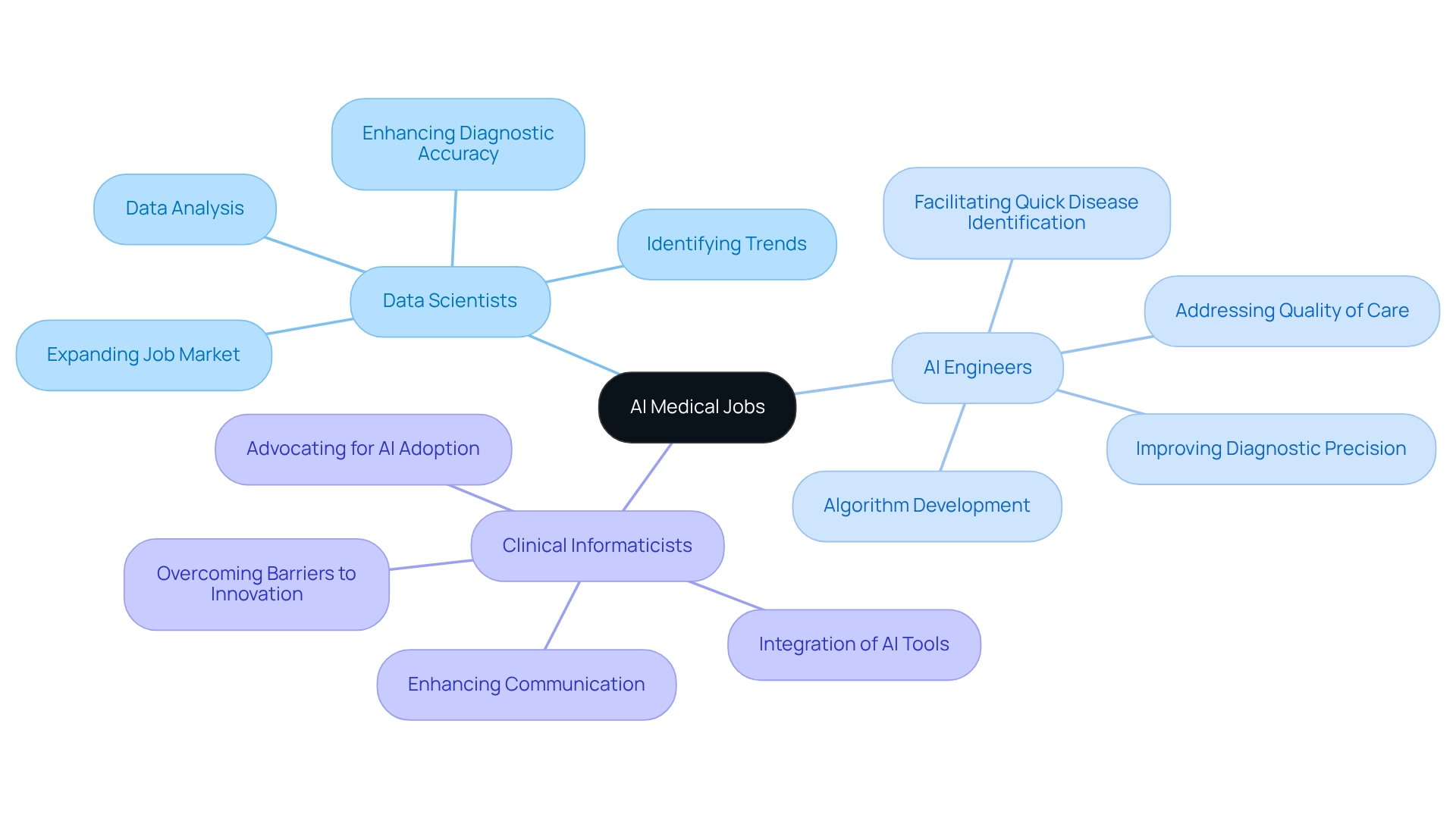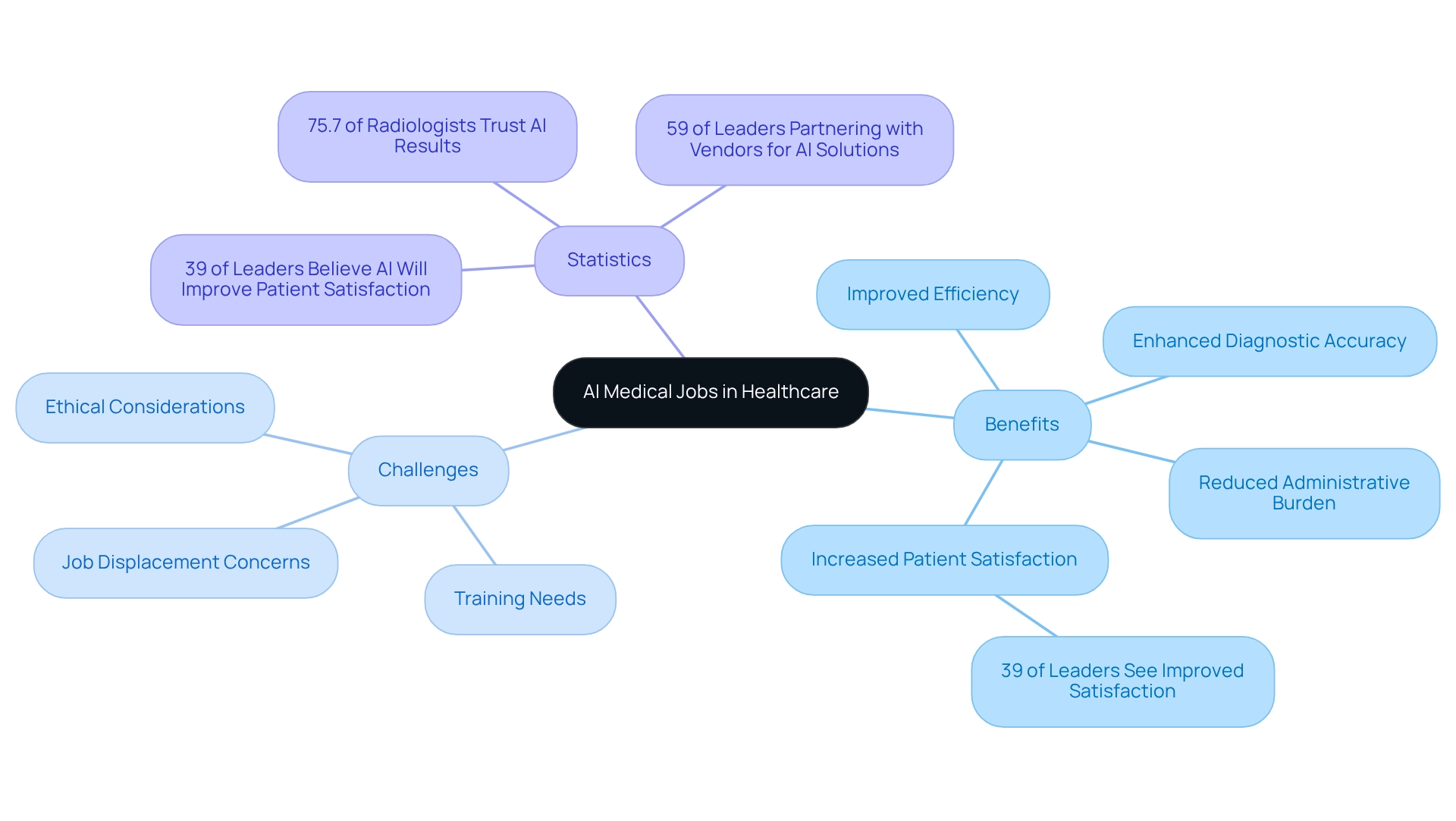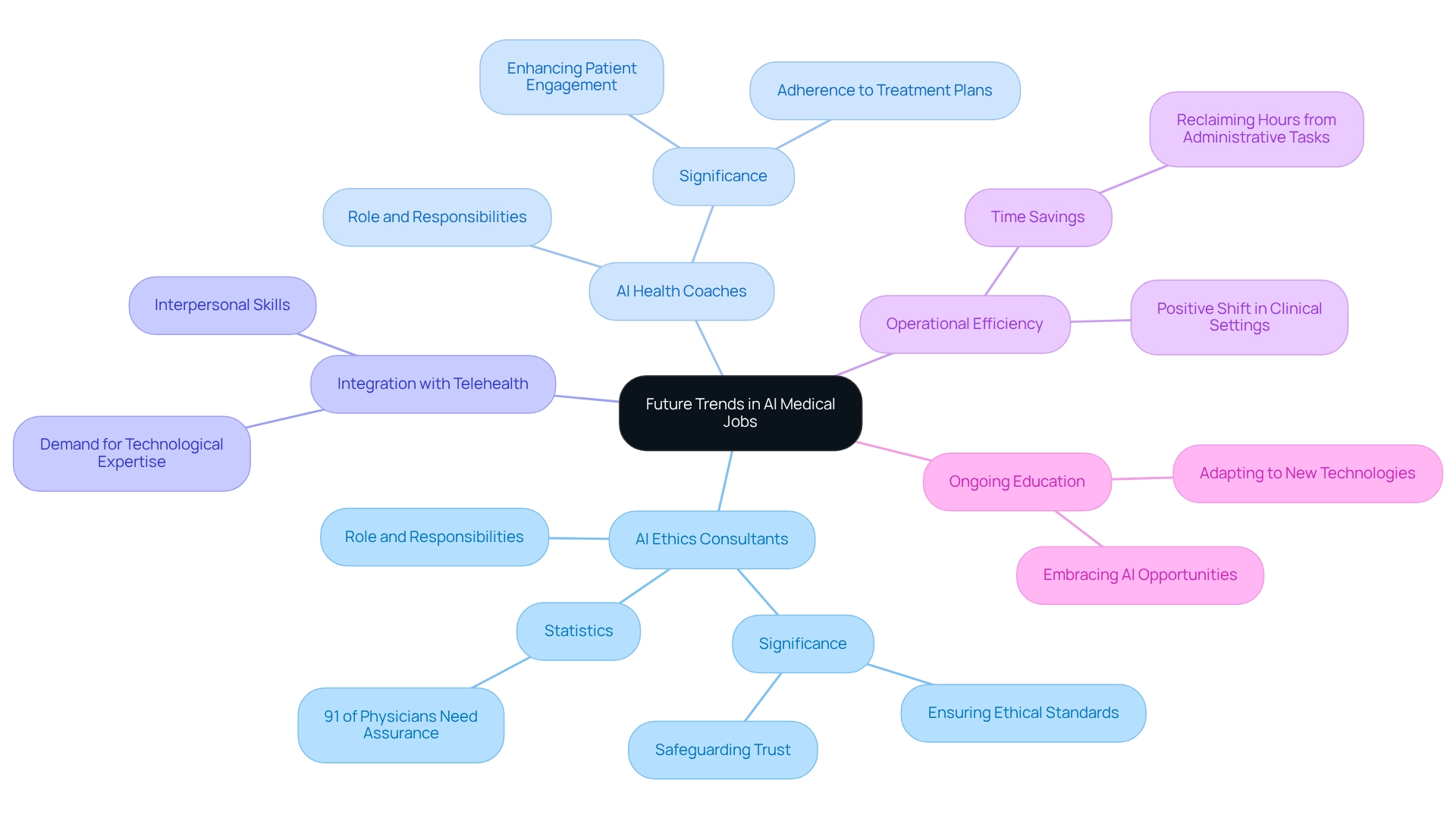Overview
This article delves into the significant roles, evolution, and impact of AI medical jobs, highlighting their crucial importance in enhancing healthcare services. It acknowledges the emotional challenges faced by healthcare providers, particularly the administrative burdens that can detract from patient care. By detailing how roles such as data scientists and AI engineers contribute to improved patient outcomes and operational efficiency, the article builds interest in the solutions that AI offers.
As we navigate the complexities of modern healthcare, the growing acceptance of AI technologies among professionals is a beacon of hope. These advancements not only streamline processes but also foster a nurturing environment for both providers and patients. Imagine a future where technology alleviates stress and enhances the quality of care.
The article encourages further engagement by inviting healthcare providers to reflect on their experiences and consider how AI could transform their daily practices. Together, we can embrace these innovations to create a more compassionate healthcare system, ultimately benefiting everyone involved.
Introduction
The landscape of healthcare is undergoing a profound transformation, and it’s essential to recognize the emotional challenges faced by providers during this shift. As artificial intelligence (AI) emerges as a pivotal force in enhancing medical practices, many healthcare professionals may feel overwhelmed by the rapid pace of change. From data scientists to AI engineers, a new breed of professionals is stepping into the spotlight, tasked with integrating cutting-edge technologies to improve patient outcomes and streamline operations.
These roles promise to alleviate the administrative burdens that can detract from patient care, fostering greater trust in AI's capabilities. However, as the healthcare sector grapples with resistance to innovation, it’s important to acknowledge the concerns that accompany these advancements. With projections indicating that over 70% of healthcare providers will adopt AI technologies by 2025, understanding the implications of these roles becomes paramount.
This article delves into the characteristics, benefits, and future trends of AI medical jobs. Together, we can illuminate the transformative potential of AI in redefining healthcare delivery and addressing the challenges that lie ahead. Are you ready to explore how these innovations can support your practice and enhance patient care?
Defining AI Medical Jobs: An Overview
encompass a diverse array of roles that utilize artificial intelligence technologies to enhance medical services. This is particularly important in addressing the emotional challenges healthcare providers face when confronted with innovation resistance. Key roles, such as data scientists, AI engineers, and clinical informaticists, play vital parts in integrating AI into medical practices. These experts focus on improving patient outcomes, streamlining operations, and alleviating the administrative burdens that often weigh heavily on medical providers. This support is crucial for addressing the concerns of risk-averse physicians.
Consider the example of AI engineers who have developed predictive analytics tools. These tools empower doctors to make informed decisions while ensuring patient safety, effectively easing their apprehensions about adopting new technologies. As the medical field increasingly embraces AI, the demand for skilled professionals in AI medical jobs is expected to rise significantly. By 2025, it is projected that over 70% of medical providers will incorporate AI technologies into their operations, signaling a strategic shift towards more efficient and effective service delivery.
Notably, 75.7% of in the outcomes generated by AI-based algorithms, reflecting a growing acceptance of AI in critical areas of medical practice. Additionally, the automation of feedback systems has been shown to enhance learning engagement by 35%, underscoring the transformative potential of AI in improving both provider and patient experiences. The development of AI medical jobs aims not only to boost operational efficiency but also to ensure that patient care remains a priority.
As Pavel Nekrasov, AI Group Manager, wisely states, "AI, like any technology, is a tool. When used professionally, it enhances quality and boosts efficiency." This perspective highlights the importance of responsible AI deployment in elevating operational quality and patient recovery, addressing the challenges faced by startups in gaining acceptance.
Looking ahead, the future of AI in medical services is anticipated to involve increased regulation and democratization, focusing on responsible deployment and accessibility. This evolving context is crucial for understanding the changing landscape of AI positions in the medical field. How can we collectively support this transformation? By engaging with these advancements and advocating for responsible practices, we can ensure that the integration of AI serves to enhance the quality of care provided to individuals.
The Evolution of AI in Healthcare: Historical Context and Development
The evolution of AI medical jobs in the medical field began in the 1950s, when pioneering computer scientists explored the potential of machines to aid in medical decision-making. Early applications primarily focused on basic data processing tasks. However, as machine learning and data analytics advanced, the capabilities of AI systems expanded significantly.
By the 2000s, AI technologies gained traction in clinical environments. Applications evolved to include diagnostic imaging, robotic surgery, and personalized treatment plans. Currently, AI medical jobs play a fundamental role in contemporary medical services, fostering advancements that enhance treatment and boost operational effectiveness. For instance, precision medicine utilizes AI to customize medical services to individual requirements, considering genetic variability and lifestyle factors. This approach improves personalized treatment plans, making healthcare more tailored and effective.
Collaborations, such as those between Microsoft and the Jackson Laboratory, exemplify how AI is utilized to curate cancer-related genetic research. This research is crucial for developing personalized treatment strategies. Organizations like UCLA are synthesizing clinical data to effectively utilize genetic insights in healthcare. Furthermore, the integration of AI is vital in addressing issues like misdiagnosis, which accounts for approximately 10% of deaths in the U.S.
Yet, the journey toward widespread AI adoption is not without challenges. Many medical professionals, especially doctors, show reluctance toward innovation due to their risk-averse disposition and concerns about preserving the quality of service and interactions with patients. At CosmaNeura, we empower medical providers with AI solutions that enhance well-being and create opportunities for AI medical jobs. By adhering to ethical standards consistent with Catholic teachings, we ensure that AI suggestions promote morally responsible patient care, aligning with the principles of faith-centered service.
This historical trajectory underscores the transformative potential of AI in medical decision-making, marking key milestones that continue to influence the future of medical services. As John McCarthy, a pioneer in the field, noted, 'The term artificial intelligence was coined in 1955,' highlighting the long-standing journey of AI's integration into medical services. CosmaNeura's dedication to enhancing physician capability through is part of our mission to transform medical services for the better, which includes the creation of AI medical jobs. We invite you to explore how we can support your practice in navigating these advancements.
Key Characteristics of AI Medical Jobs: Roles and Responsibilities
are essential in transforming healthcare services, particularly through data analysis, algorithm development, and enhancing patient interactions. These advancements can alleviate some of the burdens faced by healthcare providers, allowing them to focus more on patient care. Let’s explore the vital functions that contribute to this change:
- Data Scientists: These professionals delve into extensive datasets, uncovering trends and insights that inform clinical decisions. Their expertise is invaluable in identifying patterns that can enhance diagnostic accuracy. With the increasing demand for AI medical jobs in healthcare, the job market for data scientists is expanding, and a significant rise in opportunities is expected by 2025. This growth responds to the urgent need for innovative solutions to address challenges like fragmented care and escalating costs.
- AI Engineers: Responsible for creating and implementing AI algorithms, AI engineers are pivotal in improving diagnostic precision and operational efficiency. Their contributions facilitate quicker disease identification, which can significantly impact patient outcomes. A recent study indicates that 33% of users strongly believe AI will boost patient satisfaction, highlighting the positive influence of AI on healthcare delivery. By addressing quality of care concerns, AI engineers play a crucial role in diminishing the resistance often encountered among medical professionals regarding innovation in AI medical jobs. Additionally, clinical informaticists serve as a vital link between clinical practice and technology, ensuring the smooth integration of AI tools into medical workflows within AI medical jobs. They advocate for the adoption of AI solutions in AI medical jobs, empowering healthcare providers to utilize these technologies effectively. Their role is crucial in overcoming barriers to innovation, addressing doctors' concerns about AI implementation in clinical settings. Furthermore, AI tools can bridge gaps in medical services by enhancing communication and coordination among providers, tackling the issue of fragmented assistance. Additionally, these technologies can help alleviate physician burnout by automating administrative tasks, allowing healthcare professionals to devote more time to patient interactions and service quality.

Implications of AI Medical Jobs for Healthcare Providers: Benefits and Challenges
The integration of AI medical jobs in healthcare provides numerous benefits, but it also presents emotional challenges that healthcare providers encounter daily. Imagine the relief of significantly improved efficiency, enhanced diagnostic accuracy, and a notable reduction in administrative burdens. AI medical jobs can help automate routine tasks such as data entry and individual triage, allowing dedicated service providers to focus more on the care of their patients. Statistics reveal that 39% of medical leaders believe AI will enhance patient satisfaction, showcasing a growing confidence in its potential advantages.
Furthermore, a case study titled that while AI may automate certain tasks, positions within are expected to remain stable or even expand. This underscores the evolving roles of medical professionals as they adapt to AI advancements. However, the journey towards AI adoption is not without its challenges. Healthcare organizations must prioritize ongoing training to ensure that staff can effectively navigate new technologies. Are we doing enough to prepare our teams for this shift?
Concerns about possible job displacement for traditional roles linger, yet the outlook for AI medical jobs remains positive, with demand for these professionals anticipated to continue despite the rise of AI. Ethical considerations surrounding data privacy and the implications of AI decision-making also require our careful attention. As noted by KLAS, among surveyed medical leaders implementing generative AI, 59% are collaborating with third-party vendors to create tailored solutions. This proactive approach reflects a commitment to thoughtful integration.
Moreover, consider this: a remarkable 75.7% of radiologists express confidence in the results provided by AI-driven algorithms. This statistic strengthens the reliability of AI in enhancing diagnostic precision—a crucial advantage of incorporating AI into medical practice.
Balancing these benefits and challenges is essential for healthcare providers as they navigate the evolving landscape of AI in medicine. By embracing AI, organizations can streamline operations and improve the quality of care offered to individuals, all while adhering to the ethical standards that guide their practice, particularly those aligned with Catholic teachings. Let us work together to ensure that we harness the power of AI compassionately and effectively, for the benefit of all patients.

Future Trends in AI Medical Jobs: Opportunities and Innovations
The rapid advancement of AI technology brings forth a multitude of new opportunities in AI medical jobs, which can be both exciting and daunting for healthcare providers. Emerging roles, such as , are set to play a vital role in ensuring that AI applications adhere to ethical standards, ultimately safeguarding individual welfare and trust. It’s noteworthy that 91% of physicians seek confirmation that generative AI materials are produced by medical professionals before utilizing them. This statistic underscores the essential need for ethical supervision in AI applications.
Moreover, we can expect AI health coaches to become increasingly prevalent, leveraging AI tools to enhance patient engagement and adherence to treatment plans. The integration of AI with telehealth services is also anticipated to elevate the demand for professionals who possess a unique blend of technological expertise and interpersonal skills. As generative AI tools gain traction, over half of physicians express optimism about their potential to save time and enhance operational efficiency. This shift highlights the importance of medical professionals adapting to new technologies and embracing ongoing education.
Looking ahead to 2025 and beyond, the landscape of AI in medicine promises not only to enhance service delivery but also to transform the roles of medical practitioners. The significance of AI ethics consultants will continue to grow, ensuring that innovations align with moral and ethical guidelines. As Robert Vandersluis aptly noted, the ethics of artificial intelligence in medicine is a critical consideration that cannot be overlooked. As the job market evolves, healthcare professionals must remain agile, ready to embrace the opportunities presented by AI medical jobs while navigating the complexities of AI integration. Furthermore, case studies indicate a positive shift towards AI integration in clinical settings, reinforcing the optimism surrounding AI's role in improving patient care.
How can we, as a community, support one another in this transition? Together, we can foster an environment that embraces these advancements while ensuring that patient care remains at the forefront.

Conclusion
The integration of AI into healthcare is poised to transform patient care and alleviate the administrative burdens that often weigh heavily on providers. This transition relies on essential roles such as data scientists, AI engineers, and clinical informaticists, who work diligently to foster trust among healthcare professionals while keeping patient outcomes at the forefront of their efforts.
AI has evolved from basic data processing to a fundamental aspect of modern medicine, driving significant advancements in areas like diagnostic imaging and personalized treatment plans. While challenges such as provider resistance and ethical concerns regarding data privacy persist, the outlook for AI in healthcare is promising. Evidence indicates that AI can enhance diagnostic accuracy and help stabilize job opportunities in the sector.
Looking ahead, the demand for AI-related positions is anticipated to grow. Roles like AI ethics consultants and health coaches will play a vital part in ensuring that AI applications are ethically sound and enhance patient engagement. Embracing these advancements will require healthcare providers to commit to continuous learning and adaptability.
In conclusion, AI presents a remarkable opportunity to redefine healthcare delivery and boost operational efficiency. By seizing these opportunities, healthcare providers can navigate the complexities of AI integration, ultimately leading to improved patient outcomes and a more effective healthcare system. Embracing AI is not just about adopting new technologies; it’s about fostering a future where healthcare is delivered with greater effectiveness, efficiency, and ethical consideration.




